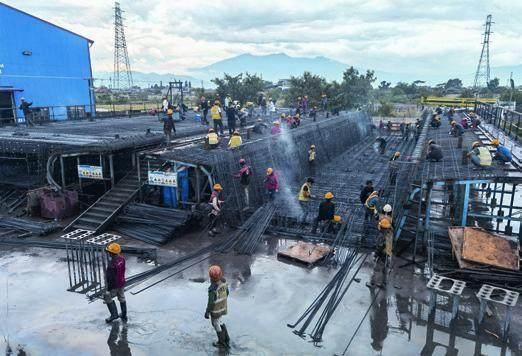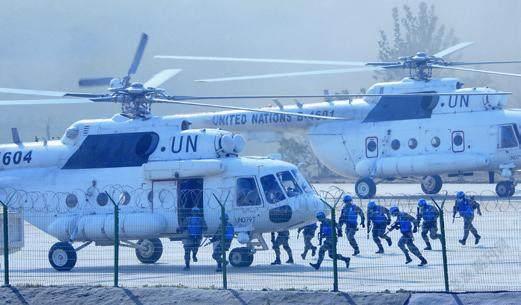For a Safer And Better World
2022-05-29ByDingYing
By Ding Ying
What does an ideal world look like? For many around the globe, the answer is quite simple: A much more friendly, helping environment compared to today’s society. Ever the peaceloving civilization, the Chinese concur.
About 2,500 years ago, amid the chaos stemming from successive wars between vassal states, the philosopher and politician Confucius (551-479 B.C.) proposed a type of “great harmony” in which people live in peace and help each other grow, all the while remaining open to the beauty of different groups and states.
Today, the world sees its people fight against a pandemic, natural disasters, poverty and even each other. China, as an emerging economy and a responsible major country, calls for the creation of a community with a shared future for humanity, initiates novel approaches to realize it and practices major-country diplomacy with Chinese characteristics for a new era.
President Xi Jinping reiterated China’s commitment when addressing the Boao Forum for Asia (BFA) Annual Conference 2022 on April 21. No matter how the world will change, “the country will unswervingly follow the path of peaceful development as a builder of world peace, a contributor to global development, and a defender of the international order,” he said.
With a civilization spanning over five millennia, China has never hesitated to share with its Asian neighbors and the rest of the world its political, economic, philosophical, artistic and scientific achievements made throughout history.
A c c o r d i n g t o A n g u s Maddison, a world scholar on quantitative macroeconomic history, whose work The West and the Rest in the World Economy: 1000-2030 has been cited in both the academic community and popular media, China’s share of world GDP peaked twice—around 1600 and 1820. The latter, 20 years before the First Opium War (1840-42) launched by British invaders against China, was the highest at 32.9 percent. China’s defeat in the war, however, led to the nation’s 100-year-long decline, humiliation and turbulence.
After the People’s Republic of China was founded in 1949, the governing Communist Party of China (CPC) has led the Chinese people to accomplish a lot in making the country prosperous and strong. Following more than four decades of reform and opening up, China in 2020 eliminated absolute poverty for the first time in its history. Its goal of building a moderately prosperous society in all respects was achieved in 2021, setting an example for other developing countries.
With a population of over 1.4 billion and the world’s second largest economy, China is playing an increasingly important and influential role on the global stage.
Mankind now finds itself in an era of profound progress as well as intense transformation and change. This is an era of numerous challenges and increasing risks, with concepts of populism, unilateralism and anti-globalization in combination with military conflict, climate change, a pandemic and poverty equally tarnishing the future of the globe.
Fully aware of the global deficits in governance, trust, peace and development, China has a strong sense of responsibility to seek a better life for all.
Taking the initiative
Using a Chinese metaphor, President Xi described countries around the world as “passengers aboard the same ship who share the same destiny” in his keynote speech at the BFA Annual Conference 2022, calling on “all passengers” to pull together to navigate the storm and sail toward a brighter future.
Ancient Chinese philosophers held that if the leadership maintained a fair and wise governance, also known as the “great way,”all of society could pursue a better life in a collective manner. For China, the “great way” lies in the actions and initiatives aiming to realize a shared, bright future based on sustainable development.
The Belt and Road Initiative proposed by President Xi in 2013 is a landmark long-term policy and investment program of China providing public goods to the world as its second largest economy since 2010 and its largest developing country as yet.

Some 2,100 years ago, Zhang Qian, a diplomat in the Han Dynasty (202 B.C.-A. D. 220) of China, explored the original Silk Road, which eventually expanded into a network of East-West trade routes linking Europe with Asia. The maritime section of said historic road, which began in the early Han Dynasty and flourished later until the 15th century, was made up of passages that connected the nation with over 100 countries in Asia, Europe and Africa—through trade.
“Countries with differences in race, belief and cultural background can absolutely share peace and development as long as they persist in unity and mutual trust, equality and mutual benefit, mutual tolerance and learning from each other, as well as cooperation and the principle of win-win,” said President Xi while first proposing the creation of the Silk Road Economic Belt during his visit to Kazakhstan in September 2013. The belt and the 21st-Century Maritime Silk Road constitute the Belt and Road Initiative.
The initiative serves as a new platform for international economic cooperation, with a focus on promoting policy coordination, infrastructure and facility connectivity, unimpeded trade, financial integration, and closer peopleto-people ties to create peace and cooperation, openness and inclusiveness, mutual learning and mutual benefit.
Unfortunately, COVID-19 rapidly spread throughout the world in 2020, taking a huge human toll and blocking global growth.
On September 21, 2021, President Xi proposed the Global Development Initiative in his statement delivered via video link during the General Debate of the 76th Session of the UN General Assembly.“We must revitalize the economy and pursue more robust, greener and more balanced global development,” he said, requesting the international community highlight its commitment to development.
He suggested all countries feature change high on their macro policy agendas, strengthen policy coordination among major economies, and ensure policy continuity, consistency and sustainability.
The world just isn’t as integrated as it should be. Pandemic aftershocks, the RussiaUkraine military conflict involving multiple global parties and the new Cold War mentality on some Western minds served as the backdrop to President Xi’s proposal of the Global Security Initiative when addressing the BFA Annual Conference 2022.
“It is important that we stay committed to the vision of common, comprehensive, cooperative and sustainable security, and work together to maintain world peace and security,” he said, underlining the importance of opposing the pursuit of one’s own security at the expense of others.’
Building a community with a shared future for humanity means China will exert every effort to, together with its partners, create a safer and more prosperous world for all.
An important part of Xi Jinping Thought on Socialism with Chinese Characteristics for a New Era, major-country diplomacy with Chinese characteristics for a new era intends to “build an open, inclusive, clean and beautiful world of lasting peace, universal security and common prosperity.”
It upholds the objectives of promoting common progress and consistently advancing friendly cooperation with other countries based on the Five Principles of Peaceful Coexistence. These principles are mutual respect for sovereignty and territorial integrity, mutual non-aggression, non-interference in each other’s internal affairs, equality and mutual benefit and peaceful coexistence.
Despite the world’s changing status quo, China will continue to pursue an independent foreign policy of peace, stay on the path of peaceful development, work toward a new type of international relations, and endeavor to build a community with a shared future, according to the government work report released in early March.
“China will always work to safeguard world peace, contribute to global development, and preserve international order. We stand ready to work with all others in the international community to make new and greater contributions to promoting world peace, stability, development and prosperity,” it read.
The report further stated that China will continue to pursue a high-standard opening up and promote the stable growth of foreign trade and investment. More specifically, the country will deepen multilateral and bilateral economic and trade cooperation. The Chinese economy, with its strong resilience, enormous potential, vast room for maneuver and long-term stability unchanged, will provide great dynamism for boosting the stability and recovery of the world economy and broader market opportunities for all countries, it said.
In March, China set its GDP growth target for 2022 at around 5.5 percent. Over the course of last year, the Chinese economy expanded 8.1 percent on an annual basis. It accounted for more than 18 percent of the world economy and contributed roughly 25 percent to global growth in 2021.
More countries will directly benefit from the multilateral development and globalization that China has been defending. Cooperation under the framework of the Belt and Road Initiative has maintained sound momentum, absorbing the shocks from disturbing factors such as the COVID-19 pandemic. Since 2021, 10 more countries have signed Belt and Road cooperation documents with China, bringing the initiative’s family to 180 members.
As stated earlier on, China has long been a proponent and protector of world peace. Since the Russia-Ukraine military conflict erupted in February, China has maintained communication with all related parties and worked toward a comprehensive solution through dialogue and negotiation.
President Xi on multiple occasions has insisted peace talks are the only viable way to prevent an escalation of tensions, noting the international community should continue to create a favorable environment for negotiations between Russia and Ukraine and make room for a political settlement, rather than add fuel to the fire and intensify hostilities. China in turn dispatched multiple batches of emergency humanitarian aid to Ukraine and sent supplies to a few European countries receiving large numbers of war refugees.
In 1990, China sent military observers to the UN Truce Supervision Organization, which marked the beginning of China’s participation in UN peacekeeping operations(UNPKO). On April 16, 1992, China dispatched its first formed military unit of Blue Helmets to Cambodia.

Over the past three decades, China has sent nearly 50,000 peacekeepers to 25 UNPKOs across more than 20 countries and regions, becoming the second largest contributor to UN peacekeeping assessments and the largest troop contributor to peacekeeping operations among the five permanent members of the Security Council. It has been hailed as “a critical element and key force in the UNPKOs,” Jean-Pierre Lacroix, UN Under Secretary General for Peacekeeping Operations, commended China’s contribution to UNPKOs as “very important.”

China has devoted itself to improving global public health governance to form strong international synergy against the pandemic. President Xi said at the BFA Annual Conference 2022 that China had provided over 2.1 billion doses of vaccine to more than 120 countries and international organizations, and will follow through on its pledged donation of 600 million and 150 million doses of vaccines to Africa and Southeast Asian countries respectively, as part of its efforts to close the immunization gap.
All in all, a distinctive Chinese style of diplomacy draws on fine traditions and adapts to the changing times—even breaking the boundaries of space.
On April 16, the three taikonauts Zhai Zhigang, Wang Yaping and Ye Guangfu onboard the Shenzhou-13 spacecraft safely returned to Earth after completing their six-month orbital mission. For those wondering, China refers to its space travelers as taikonauts—from tai kong, the Chinese word for space and the Greek word for sailor. The Shenzhou-13 crew’s trip marked a breakthrough in the key technologies of China’s space station construction.
“To explore the unknown universe and develop space technologies is a common cause of mankind which calls for the collaboration of countries. International cooperation is the trend in space development,” Wang Wenbin, a spokesperson for the Ministry of Foreign Affairs, said at a press conference two days later.
China’s Tiangong space station is the first of its kind worldwide open to all UN member states. So far, nine proposals from 17 countries and 23 entities have been included in the first group of selected projects for Tiangong’s scientific experiments. Italian astrophysicist Simonetta Di Pippo, also Director of the UN Office for Outer Space Affairs (UNOOSA), said China opening up its space station is an important part of the UN’s “Access to Space for All” initiative—and sets a great example.
This group of international cooperation projects for Tiangong, in collaboration with UNOOSA, will hopefully see the first experiments and research endeavors in space get underway later this year.
Perhaps technology will usher in a new dawn for mankind in the foreseeable future, but what the world needs right now is cooperation and exchanges between countries and regions committed to the peaceful use of outer space. As Wang said, foreign astronauts are welcome to visit China’s space station and join the taikonauts, but only under the premise that they make more positive contributions to universal exploration and the creation of a community with a shared future for humanity. BR
